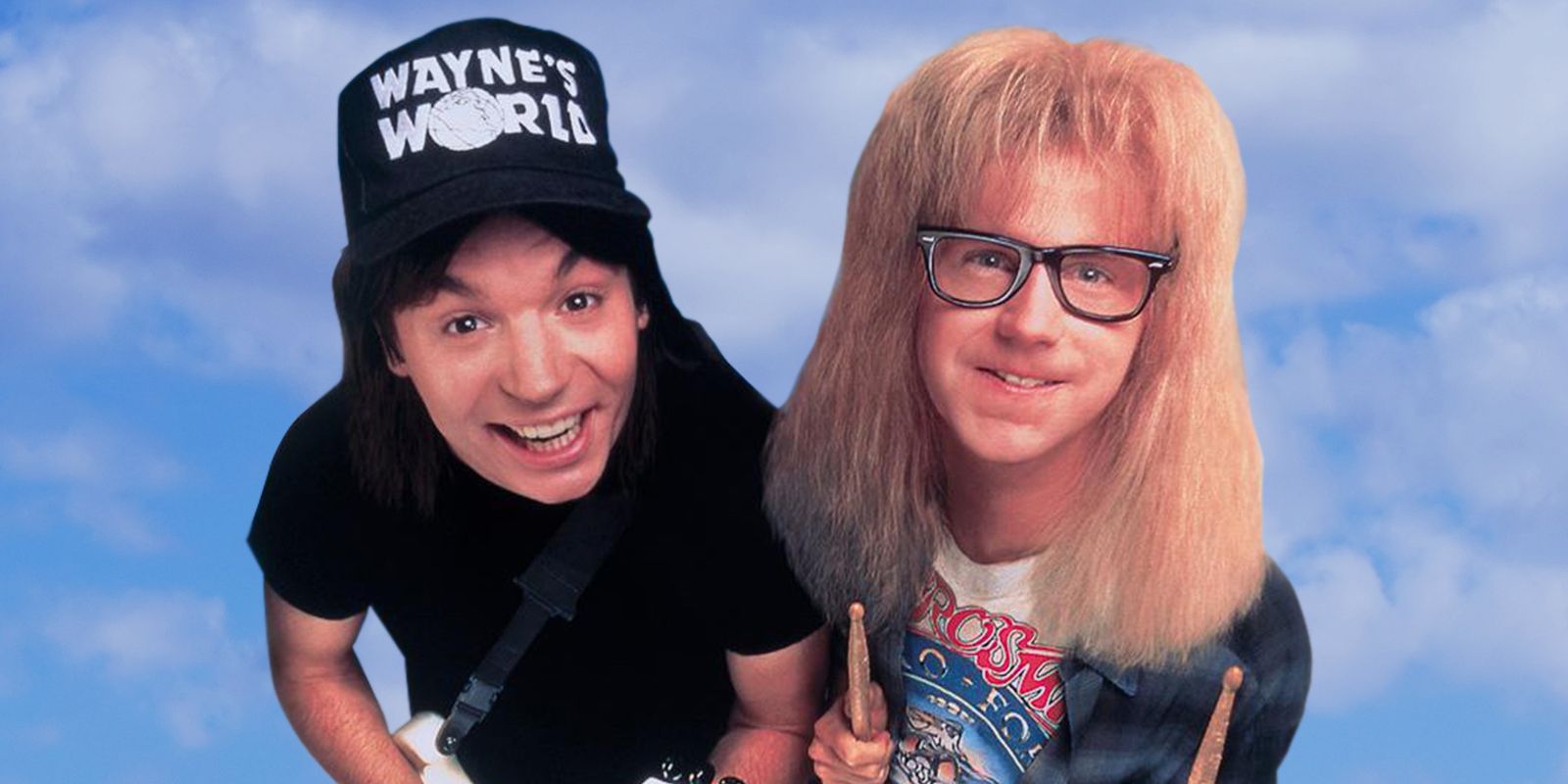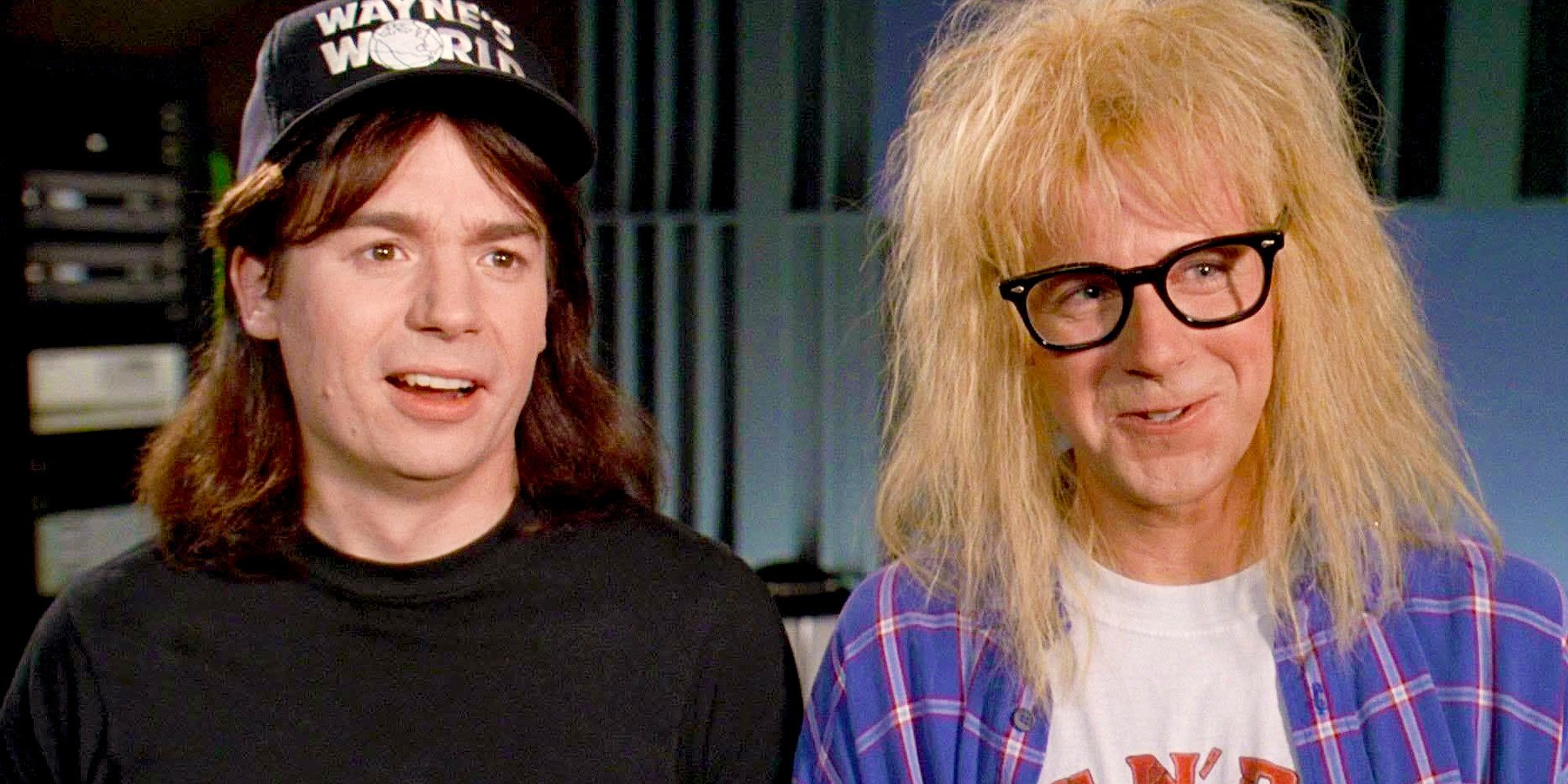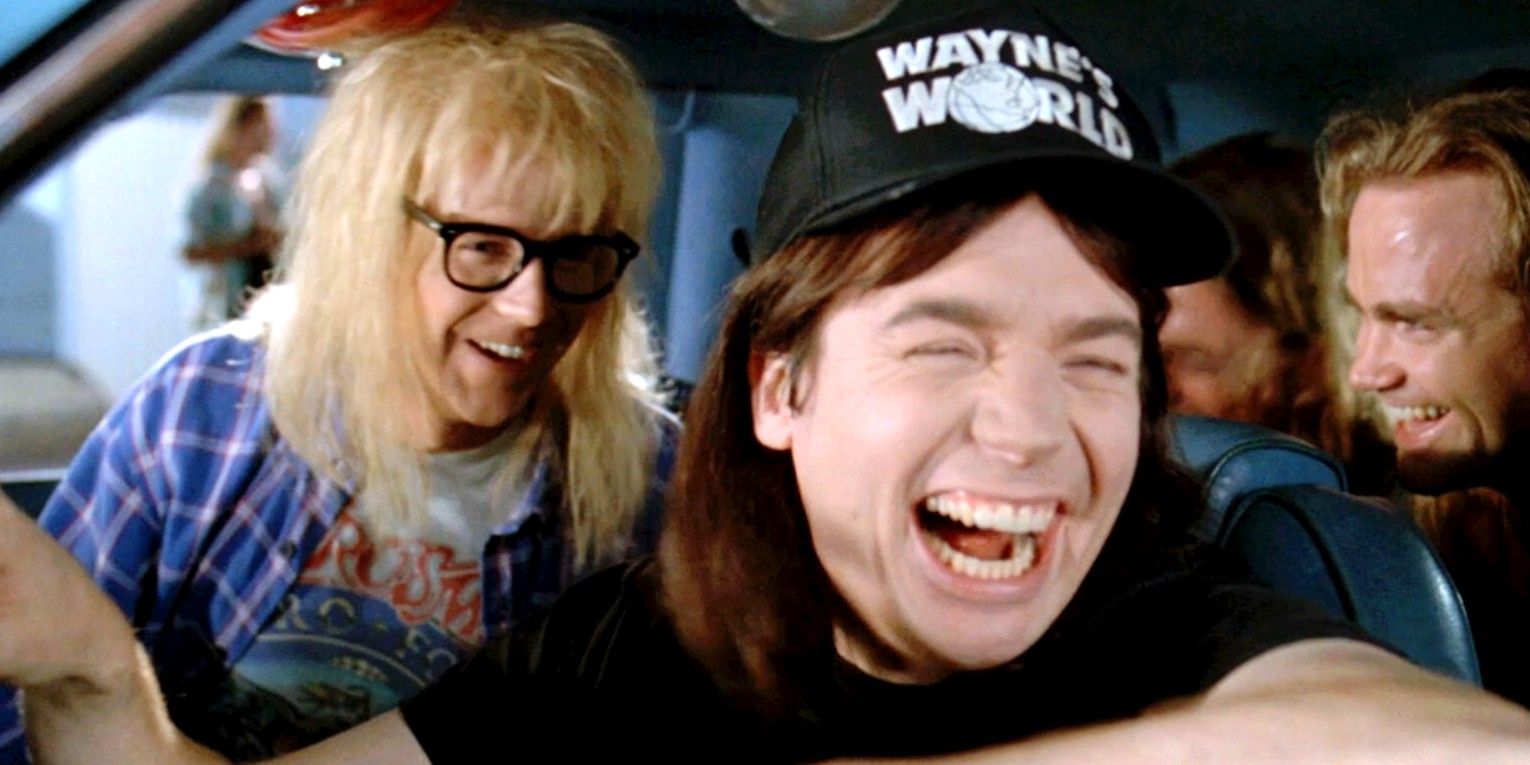It’s been 30 years since the release of the comedy classic Wayne’s World and Paramount is celebrating by releasing of film with a steel box special edition for fans on sale now. We had the opportunity to speak with the trailblazing filmmaker, Penelope Spheeris.
Spheeris is described as the rock and roll anthropologist and has been around some of the biggest names in the industry by the time she directed Wayne’s World. In this interview with Screen Rant, she recounts her experience working with comedy legends Mike Myers and Dana Carvey, and the characters of Wayne and Garth still connect with people.
Screen Rant: Penelope Spheeris, you are a legend, an icon, rock & roll anthropologist, trailblazer, and so much more. You started with these music videos and here we are 30 years later, talking about Wayne's World. It's quite an incredible writing journey you've been on. Let me just say for my own personal experience, when you guys shot the first movie, there was a little place on La Brea and Fairview, where my father lives, and you guys were shooting there with Ed O'Neill. And I had a great experience visiting set and meeting Ed and yourself-
Penelope Spheeris: Really?
30 years ago. Yes. It was a thrill.
Penelope Spheeris: You must have been two years old.
I was 10 at the time, but it was actually my first glimpse inside of Hollywood. It was quite amazing. Here we are 30 years-
Penelope Spheeris: Wow, How cool. And you're right. You can help me because so many people challenged me when I tell them that, that's where Stan Mikita's Donuts was LA on La Brea, and they go, "No, no, no. It's in Aurora, Illinois." And I'm like, Uh-uh (negative)." Because you were there.
Fairview and La Brea. I know it very well. Now, my first question for you is, there's a long history of comedic duos out there, Laurel and Hardy, Beaver and Butthead, and Wayne and Garth in the '90s. Why do you think these duos seem to stay and the test of time?
Penelope Spheeris: Because people need to laugh, and they love to laugh. When you get two comedians on stage or on camera and they have this magic chemistry, it's just unbeatable. I think people just gravitate toward it.
Absolutely. Now look, nostalgia's been all the rage in the most recent years. There's all these revivals, Ghostbusters, and every property that you could imagine seems like it's getting somewhat of a revival. Why is it that you've resisted a revival of Wayne's World?
Penelope Spheeris: Oh, I never resisted it. I think, honestly, what happened was we did the first Wayne's World, and it was a very big success. Then see, when they told me after we finished the movie that they were going to do Wayne's World 2 so soon, I thought, "Gosh, that just seems a little quick to me." Then for various reasons, I wasn't involved.
But over the years, I get scripts and synopsis and storylines, where people want to have a Wayne's World 3. I have to redirect them over to Paramount and go, "They've got the intellectual property. Go to Paramount and see if you can get that movie made."
Do you think that Wayne's World is a product of its time, or do you think it could live in the modern comedy landscape?
Penelope Spheeris: Well, it seems to be living in the modern comedy landscape because I'm talking to you and because Paramount is putting out this. I didn't even know what a steel box was. I feel like a dope, but did you know what a steel box was?
I do. I have a few. I'm a collector of these steel boxes. I dig them.
Penelope Spheeris: I guess a lot of people do, and they want to have those things they can hold in their hands rather than pressing a button on their phone. So I'm just thrilled that all these years later, 30 years later, Paramount's doing this and keeping the movie alive.
100%. Correct me if I'm wrong, upon my research, you shot Wayne's World in 37 and a half days. Is that correct?
Penelope Spheeris: Well, everybody refers to it as 34, but you have a secret, which is we sent a second unit crew to Aurora, Illinois so that we could pick up some shots that made it look like we really shot it there. I stayed home in the editing room, and they had a second unit director, and we got these extras and dressed them up as Wayne and Garth and made just really wide shots, so you couldn't tell it was them.
I haven't told anybody else this. I'm giving you my secrets, Joseph.
An exclusive here, 30 years later. But that's why there were those extra days on there. But most people refer to it as a 34-day shoot because they don't know about those two extra days.
Out of those 34 days, what was the biggest challenge during your shoot?
Penelope Spheeris: I'm going to say the biggest challenge during the shoot was making everybody happy because everybody was trying so hard. It wasn't like they were being obnoxious or intrusive about it. It was just that they really wanted to do a good job.
Mike Myers and Dana Carvey, if they were going to continue making movies, they'd better make this one work. So everybody was trying really, really hard. The writers were trying really, really hard. And the studio, everybody was.
Luckily, I'm the oldest child of four kids, and I was always placed in charge of all the kids. On the set, I was in charge of all the kids, and I had to kind of settle the arguments and diplomatically without making anybody mad, try to find something that would work for everybody. I was getting suggestions tucked in my back pocket without me knowing it.
Right. I can only imagine. Now, while SNL is still making stars yearly, why do you think SNL hasn't been able to crack the iconic character that penetrates pop culture, like in years past, like Wayne's World?
Penelope Spheeris: I think it's because of the characters of Wayne and Garth. I mean, if you look at the other films that they've done, they don't really have that kind of emotional sympathetic connection that Wayne and Garth do. Coneheads? I don't feel emotional about Coneheads. I'm sorry.
You got to have an emotional connection. I think that's the difference and I was just fortunate to be a part of that and help push it along.
Absolutely. Now, are you aware that it's been reported that Queen's Freddie mercury actually saw the "Bohemian Rhapsody" head-banging scene before he passed away? Do you know if there's any truth to that at all?
Penelope Spheeris: Well, I'm going to tell you. This is another exclusive, Joseph. Okay? Because I've heard this before, and my guess is it's not true.
My guess is it's not true. I mean, I think the only person who really, really knows is Brian May, and we might be able to ask him. If I look at the timeframe between when Freddie passed away when I finished a film is really hard to believe that somebody had access to a VHS and brought it and showed it to him. Besides that, he was very, very, very sick.
Unfortunately, I went to a party that MCA was giving over on the ship, the Queen Mary, and everybody was there except Freddie. He was sick. I'm going to have to say, somebody's going to have to prove it to me that there was that. It's a weird thing. Somebody can make that up, because who's going to say yes or no?
It's one of these legends that are just going to kind of maybe just live on.
Penelope Spheeris: Yeah, well maybe, but I'm going to have, to have it proven to me.
Speaking of another iconic rock star, we just lost Meat Loaf. Can you share any memories of Meat Loaf working with him on this film?
Penelope Spheeris: Well, I share more memories of Meat Loaf of hanging out in the clubs with him on the Strip in the '80s. We were all just drug buddies back then. How can I tell you? He would always wear a long trench coat. I don't remember what he is wearing in the movie, but probably a trench coat. We would hang out at the Rainbow and the Roxy and the Whiskey. I knew him from there, and that's why I asked him to do the movies because I was friends with him.
You are a legitimate, trailblazer and trendsetter in Hollywood. I honestly, do respect you tremendously for this. I mean, the couple of things that I found out upon research, one of them is that your agent negotiated significant residuals, which I'm sure you're probably still getting to this day. And that got you involved with the DGA. Can you talk a little bit about your involvement with the DGA and why that was so important to you after Wayne's World?
Penelope Spheeris: Well, honestly, I mean Wayne's World was my seventh movie. Before that, I didn't have the protections of the Directors Guild. For example, I was working on a low-budget piece of crap money named Hollywood Vice Squad, and the producer was in the other room, and I hear somebody go, "Action." And I'm like, "Wait a minute, man. You can't do that. I'm the director. You can't go be shooting another scene."
If I was in the Director's Guild at that point, all I do is call them up and say, "You got some psycho producer down here trying to direct." I really was so appreciative of getting into the Directors Guild. Not only for that but also for the residuals. I mean all the six movies I did before Wayne's World, I don't have any residuals from those. Do you know?
Anyway, so getting into the DGA, getting into the studio system and having Bob Raimi, who I think was the president of the Academy at the time, walk up to me on the Paramount lot and go, "How would you like to be in the Academy of Motion Pictures, Penelope?" And I thought, "Do you know who you're talking to? I'm some chick from a trailer park." It's like, yeah, I want to be in the Academy.
That's amazing. Now look, you're really good at capturing the human story. I mean, just like your documentary, The Decline of Western Civilization, it really captures the human story and the punk rock scene. And then in the second one, in the metal scene. Capturing the human story, just talking about that for a second, you've worked with so many legendary comedians, Richard Pryor, Danny DeVito. You've worked with them all, and you've captured their human spirit and their human story. Like I said before, you're a rock and roll anthropologist, but you're really good at understanding the subject matters, which are the people.
This is a long way of asking. Can you talk to me about Mike Myers and working with Mike and the human story of him being a comedian? Because I know that some of the times it wasn't the easiest working with him, especially in that era. Can you just talk about that experience a little bit?
Penelope Spheeris: Well, I mean, we all have our backstory, we all have our little quirks and tweaks. Do you know what I mean?
Mike back then was very kind of fragile and extra, extra careful, and never wanted to make a mistake when we were shooting. He wanted everything to be just right. Honestly, it was a little bit like walking on eggshells dealing with him, because I didn't want to say the wrong thing or set him off or anything.
Dana was a little easier because he doesn't have that vibe like, "Oh man, don't mess with me." But Mike was ... But it was only because he was trying to do a good job. There is a lot of talk about how we didn't get along on set. But honestly, there was only one time I remember that we had a disagreement and it was because I was trying to shoot ...
It was at Stan Mikita's. He didn't have any margarine for his bagel, and he's hypoglycemic, so you don't want to get him in a bad mood. If you don't have your blood sugar up, you kind of get grumpy. Okay. So I understand that he can't help it. Whatever. Anyway, so I'm waiting and trying to get some margarine. But I mean, what a silly little thing. That was not a big deal. It doesn't mean that we didn't get along on the set.
I mean, when the movie was over and I didn't get to direct Wayne's World 2, I was really devastated, to be honest with you.
Justifiably.
Penelope Spheeris: Yeah. But I look at it like a really beautiful life lesson that made me stronger in that I can get over rejection. I can get over that and not care about it. I'm like, "Okay, you don't want me? Bye. Goodbye." I can do that.
I have my last question for you. Look, I am a huge fan of the Decline of Western Civilization. I think it is amazing. I've heard you in the past talk about Frederick Wiseman as one of your favorite documentarians. What is it about his style that attracts you?
Penelope Spheeris: Okay, brilliant question. Thank you. I wish documentarians that are making movies today would look at that. And it is that Frederick Wiseman would set up a camera and be totally objective and let you see what was going on without imposing his own thoughts and standards about it. And that's what I loved about his work.
When I do my docs, I want to be objective. I want to say, "Look, you got some punk rockers. They're a pain in the ass. They're gnarly. They're nasty, whatever. You judge. I'm not going to tell you they're great. Not going to tell you they're not great."
Somebody like Michael Moore, for example, he's jamming it down your throat about, "Why don't you believe what I believe?" I'm sorry to put somebody down, but that's the deal.



